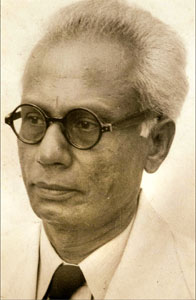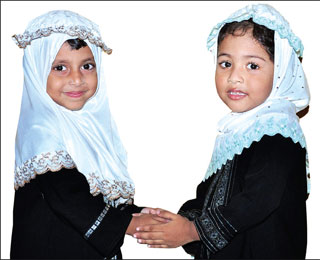|

Do not miss extra curricular activities
Dear children,

I know all of you attend school with a great deal of interest.
Remember that you are passing the most important period of your life.
You have to attend classes attentively and be obedient to teachers. Give
equal importance to all the subjects.
But you should also know that studying books alone will not make you
a complete person. You have to participate in extra curricular
activities as well. There are students who try to stay away from PT
lessons under the pretext of false sicknesses. Some try not to
participate in school debate societies or drama sessions considering
them as a hindrance to their studies.
But it is much later in life that they understand how much they have
missed by staying away from these extra curricular activities. These
activities are important to develop your inter personal and
communication skills. It helps the growth of your personality. Those who
have participated in such events can face challenges in life better than
those who had only been bookworms. Later in life they can handle any
superior position at their work place without any difficulty.
Hence better not consider extra curricular activities as a problem.
Whenever you have time you better engage in extra activities such as
drama practices, sports events and participate in school debates. Then
you yourself can identify the leadership skills that are within you and
you can sharpen these skills with the assistance of your teachers.
Bye for now,
Sanju
[email protected]
Great Minds:
The Sage of Koggala: Martin Wickramasinghe
During the late 1890s there lived in the small village known as
Koggala, a boy called Sammy or who was known to the villagers as Opisara
Gedera Punchi Mahaththaya. He would grow up to be hailed by eminent
scholars like Professor Joseph Needham as the Sage of Koggala. He was
the author of books you have read like Madol Duuwa, or heard about, like
Gamperaliya and Viragaya. He wrote many more books too, about our
culture, our history, about the theory of evolution… Yes, you know him.
He is Martin Wickramasinghe.
|

The Sage of Koggala |
Born on May 29, 1891 he was the only son in his family. He learnt his
alphabet from Andiris Gurunanse, who taught most of the children in the
village to read and write. In 1897, the next step in his schooling began
when he was sent to the village temple to study under the guidance of
Koggala Malalagama Deerananda himi.
Next he attended the school in Unawatuna, Bonavista, to get an
English education. He had to leave this school after his father passed
away. In 1904 he joined the Sinhala school in Ahangama. After only two
years at this new school his education came to a halt and he started to
earn a living as a clerk in a shop owned by a businessman called Carolis
Silva in Colombo.
This meant saying good-bye to the playful carefree life he had lived
in the village, roaming the jungles, rowing in the lake, searching for
nuts, madan and mangoes. Even though the harbour, the sea, the
breakwater and the zoological section of the museum, in Colombo
fascinated him, he started to lead a life of a loner in Colombo,
surrounded by his favourite companions – books.
Whenever he had time on his hands, he began to pursue in earnest the
questions that had been bothering him from childhood. How did the trees,
the mountains, the sea come into being? How did the world begin? Having
paid 50 cents to buy the book Human Origins, and impatiently begun to
read it he discovered to his dismay that his English knowledge was not
enough to understand what the book said. Undeterred, he bought a pocket
dictionary and began to read Robinson Crusoe and Gulliver’s Travels. He
learnt new words and phrases in English by reading books written by
George M Raynolds. He also read Thomas Hardy, Dickens, Tolstoy,
Dostoyevsky and Turgenev.
Thus, having improved his English on his own, he took up the books on
the theory of evolution, and understood what it meant.
He also read the Sidath Sangarawa, and developed a love for classical
Sinhala poetry, especially the Guththila Kavya, to which he would turn,
time and time again, as someone seeking the company of a greatly loved
friend.
The next step in his career began when he joined the Sinhala paper
the Dinamina. On November 30, 1925, he married Kathaluwe Balage Prema de
Silva. In 1927 he left Dinamina and joined Lakmina.
Three months later the circulation of Lakmina increased from two
hundred copies a month to four thousand a month. He worked from nine in
the morning till eight or nine in the night but never felt tired because
he loved what he was doing. The love and dedication he felt for the
paper was such that for many months he worked without pay. Finally,
however he had to resign, give up the house he lived in and move to a
single bedroom house with his wife and four children. He earned a living
by starting a press of his own.
After some time he was asked once more to take the post of Editor of
Dinamina by D R Wijewardena. Knowing that he had to think about the
future of the children he accepted the offer. After having worked as an
editor for three newspapers for more than fifteen years he retired in
1946 and devoted most of his time to reading and writing.
The subjects Martin Wickramasinghe explored ranged from anthropology,
to biology, from social sciences to Buddhism, from philosophy to fine
arts. He wrote 14 novels beginning with Leela in 1914 and ending with
Bawatharanaya (Siddhartha’s Quest) in 1975. Gamperaliya (The uprooted)
was published in 1944, followed by Madolduwa (Mangrove Island) in 1947,
Yuganthaya (End of an Era)in 1949, Viragaya (Devoid of Passion) 1956,
and Kaliyugaya (Age of Destruction)1957.
Among his eleven collections of short stories are Gehaniyak (A
woman), 1924 and Ape Viththi (About Ourselves)1946. He also wrote four
dramas Chitra (1940), Mayuri (1944), Vijitha (1953) and Vijitha and
Other Plays (1953) as well as on travel, history, three literary
biographies, six books on philosophy and other topics, five on evolution
and anthropology, and numerous essays of literary criticism. Several of
his novels were made into films and teledramas.
He wrote the first book on the social history of Sri Lanka – Purana
Sthreenge Anduma, and the first science fiction book for children,
Sinhala Vidya Vinoda Katha. He was also a critic, and would go down in
literary history as the one who changed the basis of Sinhala literary
criticism which had hitherto been modeled on Pali and Sanskrit
literature by introducing a more rationale view in judging works of art.
He also introduced new words into the Sinhala language.
Martin Wickramasinghe believed that books are the best companions a
man could ever have. Some books he says are talkative, some are serious
and stiff. But you can easily love all of them. He knew, once you begin
to love them you can never let go. Should not we too, make books, our
friends?
- Aditha
[email protected]
Holy Prophet Muhammad’s birthday
 The
birthday of Holy Prophet Muhammad falls on January 25. It is a
significant day for Muslims throughout the world. While celebrating this
solemn occasion we must commit ourselves to follow the teachings of our
Holy Prophet in day-to-day life. The birth of the Holy Prophet Muhammad
is considered to be a blessing to humanity by His followers. The Holy
prophet was also known as Al Ameen during the early Mecca period due to
his honesty. The
birthday of Holy Prophet Muhammad falls on January 25. It is a
significant day for Muslims throughout the world. While celebrating this
solemn occasion we must commit ourselves to follow the teachings of our
Holy Prophet in day-to-day life. The birth of the Holy Prophet Muhammad
is considered to be a blessing to humanity by His followers. The Holy
prophet was also known as Al Ameen during the early Mecca period due to
his honesty.
As we celebrate the Prophet’s birthday we should recall the Prophets’
times. He said, “His period is the best period” because all his
companions and followers of His exemplary teachings strictly followed
the Holy Quran.
Muslims in Sri Lanka too should follow the teachings of the Prophet
and follow the Holy Quran strictly.
Make your fervent prayer on his holy day for peace, harmony,
tolerance, understanding and brotherhood.
Text and Picture by Ruzaik Farook
My favourite toy
My favourite toy is a remote car. Its colours are blue and black. It
has four wheels. It is shining and beautiful. I put it in a box. It goes
very fast. It has a remote to play. It has four lights. It has two
batteries. I love my toy car very much.
Tuan Imad Jayman
Grade 2A
Sailan International School, Negombo
My school
My school is Stanley Thilakarathne Vidyalaya. It is a primary school.
There are eight teachers and about 200 children in my school. My school
garden is very nice. I love my school very much.
G Shisuka T Pinnaduwa
Grade 2
Stanley Thilakarathne Vidyalaya
Mirihana
Nugegoda

|







